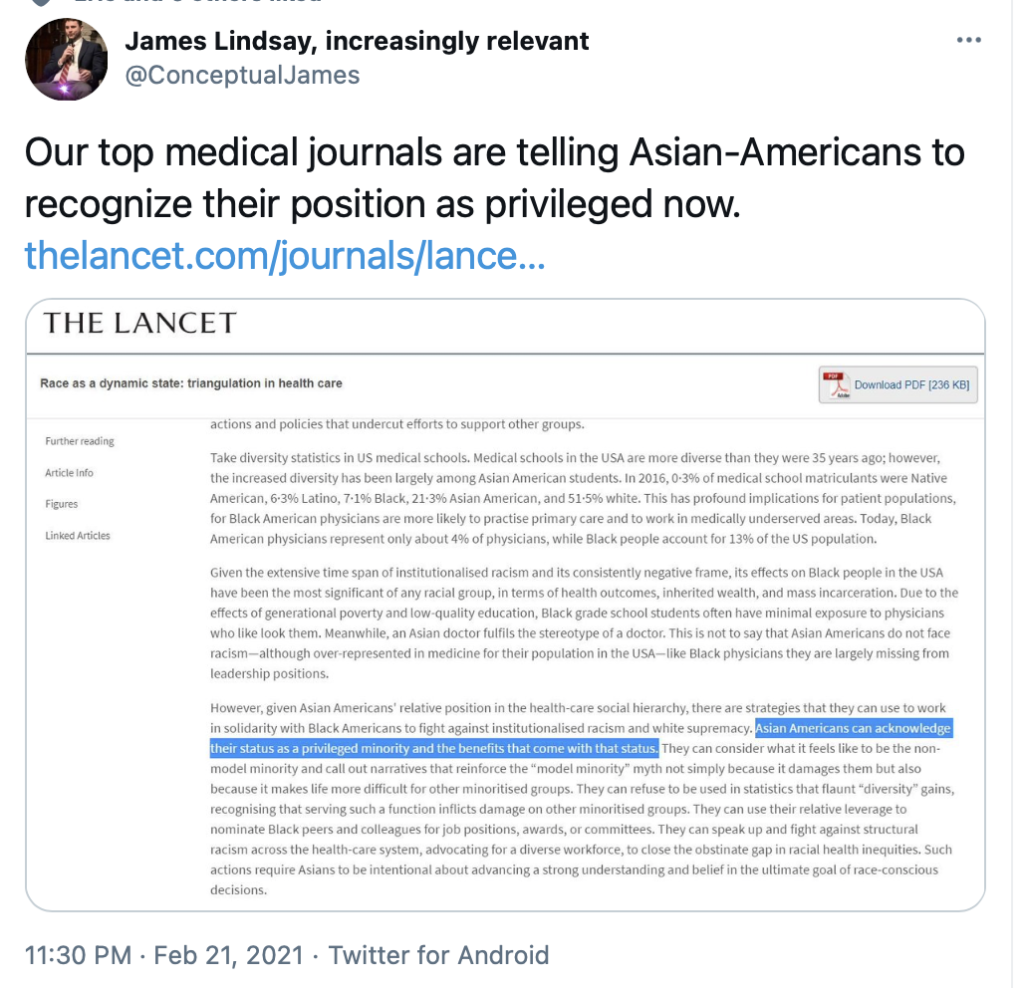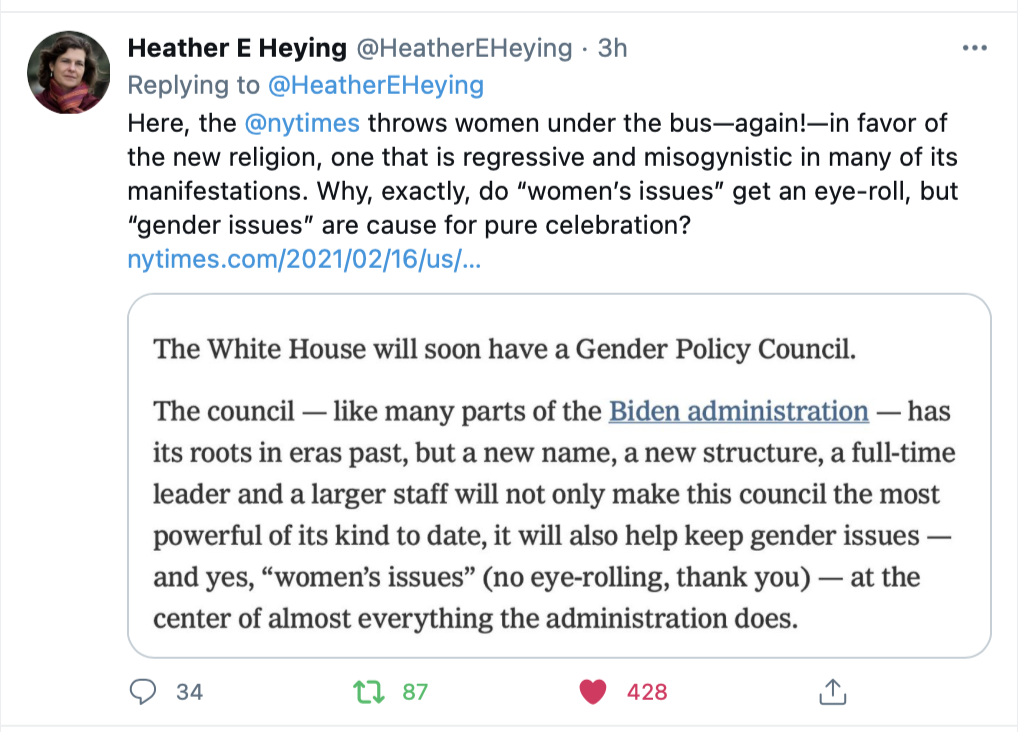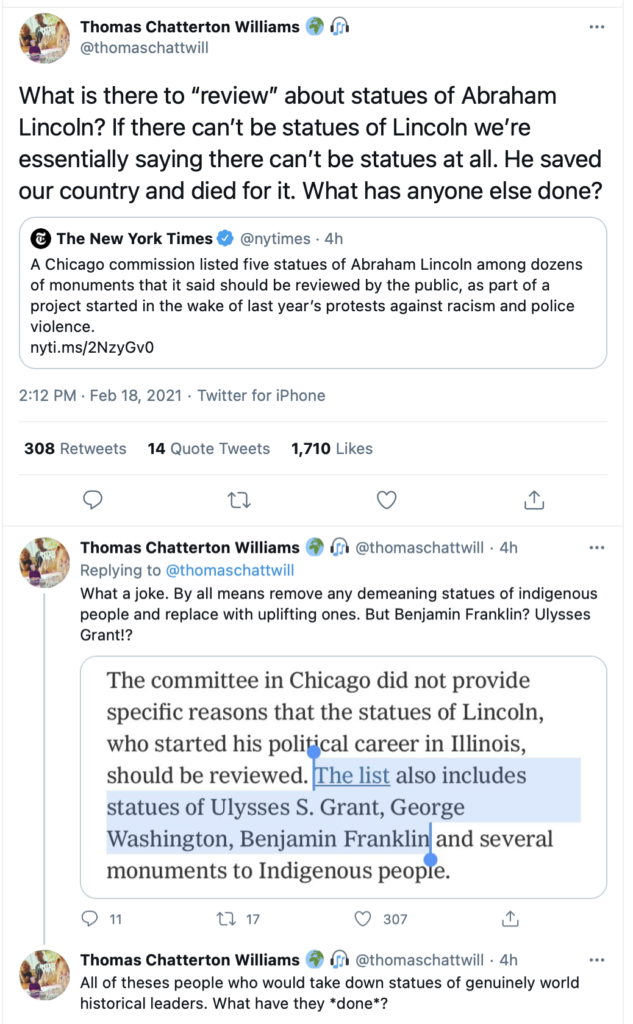The medical journal Lancet is an unrepentant convert to Wokeness, as recently pointed out by James Lindsay on Twitter:

In this January 2020 article, “Race as a Dynamic State: Triangulation in Health Care,” The Lancet has turned its Woke-powered spotlight toward “Asian-Americans.” According to this article, in a prestigious medical journal, all “Asians” are the same. Therefore, we can put all of them under one group heading and treat all of them inter-changeably, regardless of their country of origin, and regardless of how hard each “Asian-American” individual has studied in order to be successful in the health care field. And that is merely the first of the many shocking assertions of this article.
This Lancet article scolds “Asian-Americans” for their “privilege,” as if they unfairly achieved excellence merely by being born “Asian.” This article swipes at Asian American are racist in the most basic sense; it judges the characteristics, history and achievement of individuals by irrelevant immutable characteristics. Unfortunately, this sordid tactic passes as “social justice” in ever-increasing numbers of institutions, most notably in our sense-making institutions such as universities and in the conference rooms at publishers such as Lancet. I prefer to call this increasingly popular tactic “neo-racism” because it is the modern heavily-jargoned repackaging of good old-fashioned racism. It's the same despicable idea over which we fought a bloody Civil War. In the year 2021, then, Lancet is proudly promoting a completely discredited destructive approach for interacting with one another.
This Lancet article is preaching, not teaching. No open-minded person could have written this Lancet article. Tt presents a long string of obviously wrong-headed and highly controversial concepts as gospel, evidence-free. These issues raised by this article would have been discussed by any good-faith consideration of this topic of “racial” disparities in the healthcare field. Instead, the authors of this Lancet article intentionally avoided these many issues.
Back at Twitter, commenters had no problem spotting these many glaring problems instantly. I have selected and pasted in some of these comments below. The following comments below allow us to use the above Lancet article as a Wokeness case study:
According to this, Asians attending medical schools, are the "wrong" kind of diversity...
This is so incredibly racist. How does anyone stand for this degradation?
What happened? I thought we were NOT supposed to pick people . . . based on their color.. now that’s the top consideration!
This is their way of minimizing the data that shows Asian achievement being better than white people because they know that collapses their unifying white supremacy equation.
Essentially, they are telling them to recognize they are a “privileged” minority class because it makes other minorities (i.e. blacks) look bad... They mean because it destroys their narrative!!!
The tone and lack of self-awareness on part of writers is what shocks me, even more than the twisted content. They are simply telling people what to do. Extraordinarily patronising and controlling.
Didn't they put Asians in the "white" category recently? All to perpetuate their systematic racism myth.
“And what shall we do when we run out of enemies to destroy?” “Simple, we shall make more”
Yeah, but how did they become privileged? Was it magic?
Attacking the competent has always been a hallmark of Marxism. They won't stop until the starving are attacking the almost-starving.
I like the sentence just after your highlight. "They can consider what it feels like to be the non-model minority" So they are a minority, but a non-model one! "They can refuse to be used in statistics that flaunt “diversity” gains" Oh my... The best science for better lives. WTF!
“Model minority” Asians are a “model minority” and therefore outside of CRT models and therefore part of the problem bc they don’t fit the narrative of overcoming obstacles of oppression. Jews also defy CRT- as if their oppression doesn’t count.
Just wait until they start turning against Nigerian immigrants who are among the hardest working out there...
So “model minority” is a myth but “non-model minority” is not?
Mind you, this is entirely within the western world and not actually in Asia, for the most part. It's so unbelievably stupid.
[More . . . ]



